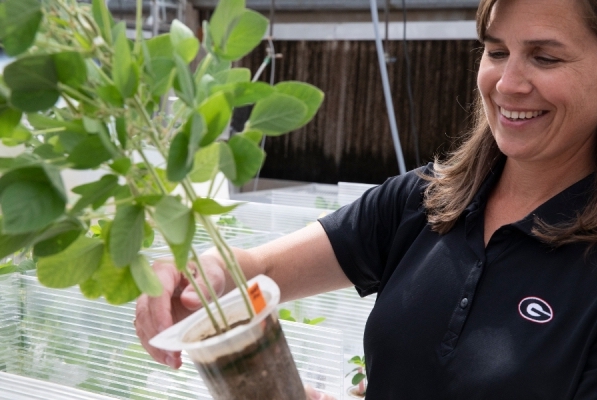Georgia, USA
January 6, 2022

The $1.2 million award will allow plant pathologist Melissa Mitchum (pictured) to study the metabolic basis of SCN resistance and its effects on plant growth while Beamer explores the biochemistry and 3D structure of the soybean enzyme and genetic variants.
University of Georgia plant pathology researcher Melissa Mitchum will co-direct a $1.2 million award from the joint National Science Foundation and U.S. Department of Agriculture National Institute of Food and Agriculture (NSF-NIFA) Plant-Biotic Interactions Program to help combat a devastating soybean pathogen with colleagues at the University of Missouri (MU).
The soybean cyst nematode (SCN), a microscopic roundworm, is responsible for annual crop losses of $1 billion in the U.S. alone. Mitchum, a professor in the Department of Plant Pathology and the Institute of Plant Breeding, Genetics and Genomics in the UGA College of Agricultural and Environmental Sciences, will co-direct the four-year award with MU biochemistry researcher Lesa Beamer.
Mitchum and Beamer began collaborating several years ago to try to understand more about the biochemical basis of soybean resistance to SCN. Mitchum, an internationally recognized researcher in the field of plant-nematode interactions, performed pioneering studies identifying two amino acid variants in a soybean enzyme that were associated with resistance to SCN.
The use of SCN-resistant soybean cultivars is the most effective way to manage SCN infestations in the field. In an interdisciplinary effort, biochemistry researchers — including Beamer, who specializes in structural biology — were able to show how the variants Mitchum identified affect the function of the soybean enzyme.
The $1.2 million award will allow Beamer to follow up on these initial results by further exploring the biochemistry and 3D structure of the soybean enzyme and genetic variants while Mitchum studies the metabolic basis of resistance and its effects on plant growth.
Together, these researchers hope to identify novel ways to combat SCN infestations in soybeans.
“SCN adaptation on the major source of resistance found in more than 95% of commercial soybeans has become a widespread problem. I’m excited by the interdisciplinary nature of this project and the opportunity we have to translate discovery into a solution to help growers fight back,” Mitchum said.
“I think the funding agencies really liked the collaborative nature of this project. And it’s been very exciting for me to do research that addresses a real-world problem,” Beamer added.
To learn more about research in UGA's Department of Plant Pathology, visit plantpath.caes.uga.edu. To follow along with Mitchum's lab, visit caes.uga.edu/mitchumlab.